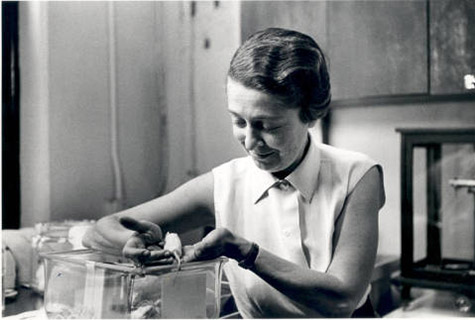
Members of the Washington University in St. Louis community will gather at 4 p.m. Tuesday, Oct. 15, in the Ginkgo Room of Olin Library to remember Rita Levi-Montalcini, one of two women from the university who won the Nobel Prize. Levi-Montalcini died Dec. 30, 2012 at the age of 103.
The event, hosted by the Woman’s Club of Washington University, is free and open to the public.
Levi-Montalcini discovered nerve growth factor, a cellular “factor” that the body uses to direct the growth of nerve networks. In 1986, she shared the Nobel Prize in physiology or medicine with biochemist Stanley Cohen, PhD, also of Washington University, who helped her identify the factor.
Her work is still in the news. On Oct. 2, scientists at the University of Oregon reported that the level of nerve growth factor in spit varies with responses to stress and predicts long-term psychological health.
As an Italian Jew, Levi-Montalcini had the misfortune to begin her career in the 1930s. Forced to leave the University of Turin when Mussolini came to power, she continued her research in a laboratory she set up in her bedroom in Turin.
Viktor Hamburger, PhD, then chair of the zoology department at Washington University, was working in St. Louis on the same research problem as Levi-Montalcini. In 1946, he invited her to St. Louis to see if they couldn’t reconcile their disparate findings.
She became a full professor at WUSTL in 1958, then established a research center in Rome, and for some years divided her time between St. Louis and Rome.
In her autobiography, In Praise of Imperfection: My Life and Work, Levi-Montalcini described her years at Washington University as “the happiest and most productive years of my life.”
The memorial will open with short talks by current faculty who are in a position to appreciate Levi-Montalcini’s scientific contributions or who knew her personally. Speakers include Jane Schaefer, president of the Woman’s Club; Kathyrn G. Miller, PhD, chair and professor of biology in Arts & Sciences; Ralph S. Quatrano, PhD, dean of the School of Engineering & Applied Science and professor of biology; and Garland Allen, PhD.
Hamburger, Levi-Montalcini’s colleague, hired Allen, professor of biology, in 1967. “We seemed to hit it off,” Allen said, “perhaps because she knew I was a historian of science and most Europeans, like Viktor and Rita, had a strong appreciation for history.”
The prepared remarks will be followed by an open forum, during which others who knew Levi-Montalcini will speak about her influence on their lives. Ilene Follman was a student of Levi-Montalcini’s and remembers how important it was for a woman studying science in the early 1960s to have female mentors such as Florence Moog and Levi-Montalcini.
“As a junior, I took a course in neurology from Rita Levi-Montalcini,” Follman said. “She was a demanding professor, but she was always fair. At one point, we were studying a series of slides, and I realized that something about one of these slides was wrong. I questioned the lab assistant about it and he called Rita over. I was right about the slide, and after that she kept an eye on me, inviting me to work in her lab in my senior year.”
The memorial, which is co-sponsored by the Woman’s Club, Olin Library and the Department of Biology, will conclude with the presentation of books about Levi-Montalicini to Olin Library.
When Schaefer learned that Levi-Montalcini once rented a room in her house, she borrowed In Praise of Imperfection: My Life and Work from the University City library. It impressed her enough to recommend it to Diana Bose, a friend who had worked in the botany department when Levi-Montalcini was at WUSTL.
Bose knew that Lucy Rava, who had worked for Levi-Montalcini, owned a copy of the book. “Lucy worked in the lab with her on the third floor of Rebstock when I was in the basement working with Barry Commoner,” Bose said.
So when Rava died last year, Bose asked Rava’s brother, John, about the autobiography. “It turned out that Lucy had about 10 books, some written by Rita in Italian, some about Rita, and a few about her twin sister’s paintings, “ Bose said.
John Rava and his wife, Susan, who taught French at WUSTL for many years, are donating all of the books to the library.